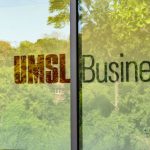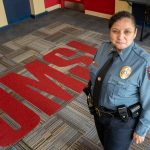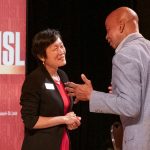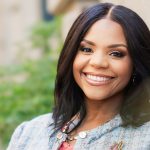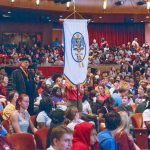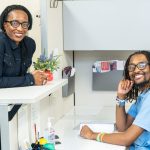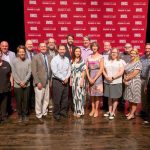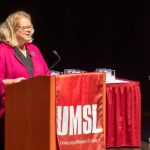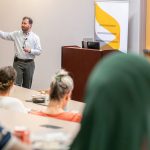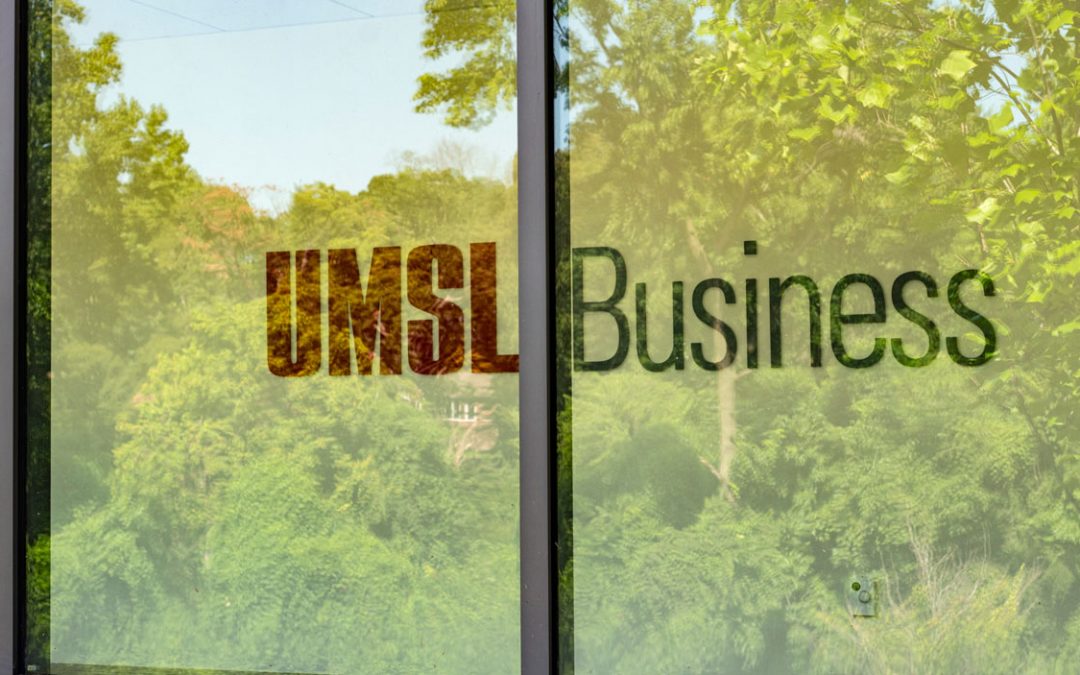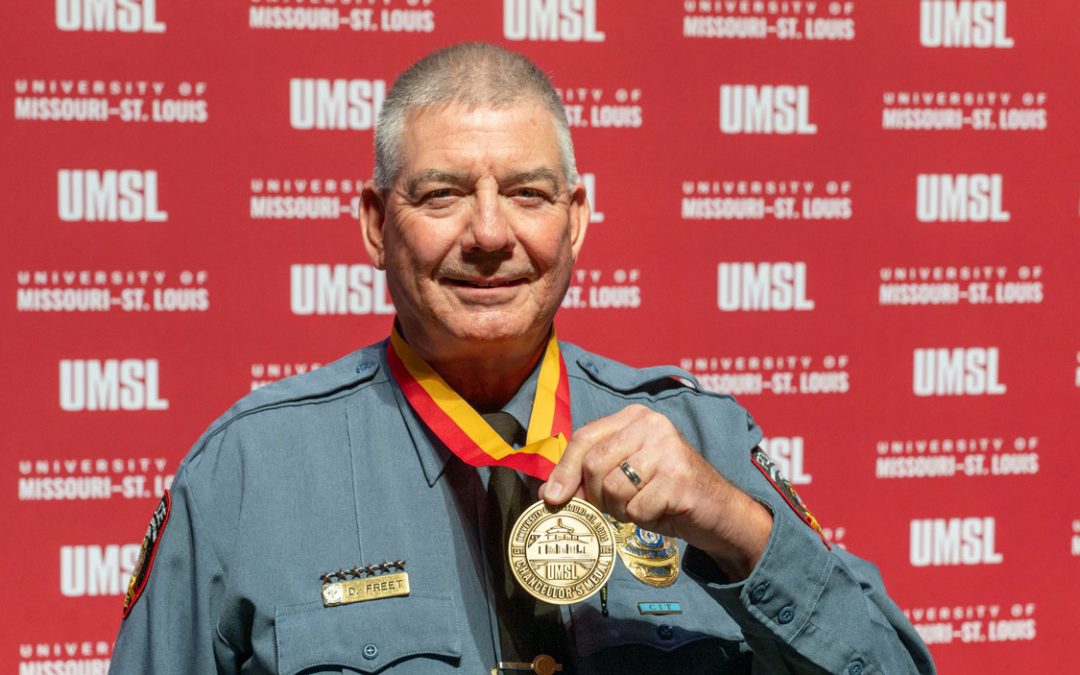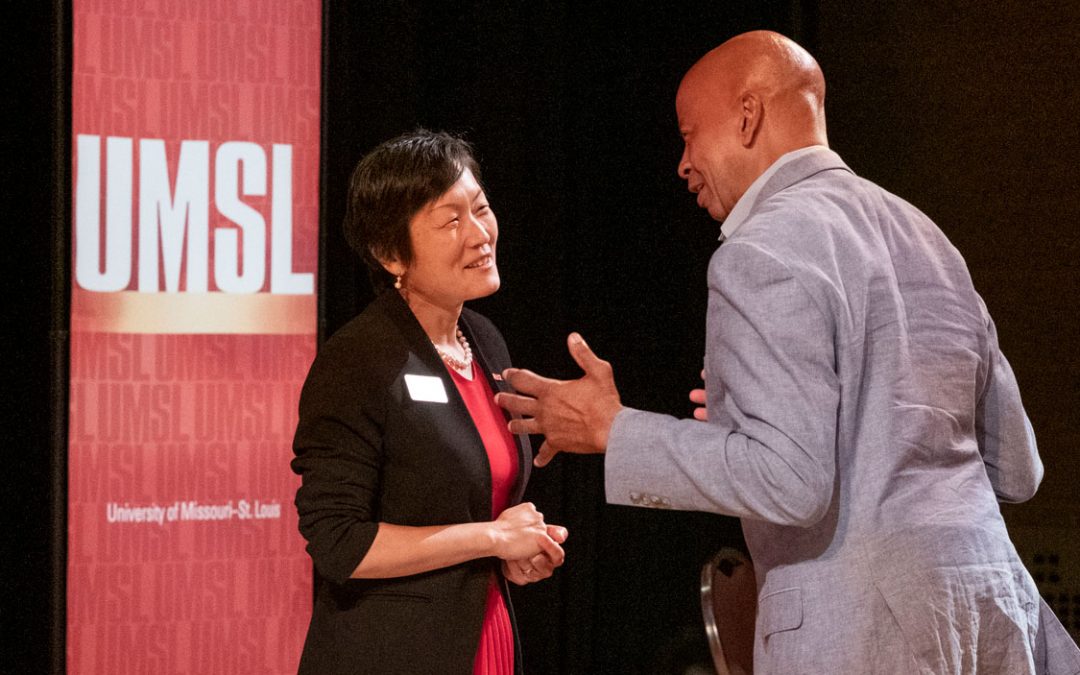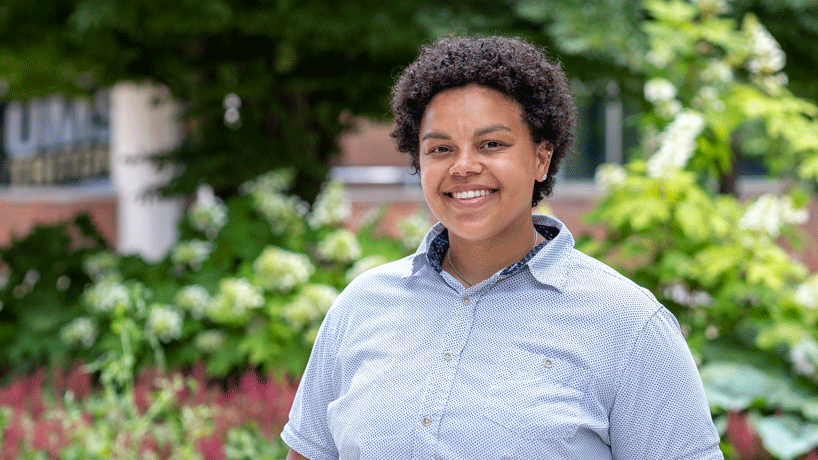
Ariana Smith is UMSL’s new LGBTQ+ and Diversity Coordinator. She began her new role today. (Photo by August Jennewein)
While the pandemic may have quieted this year’s Pride Month activities at the University of Missouri–St. Louis, new LGBTQ+ and Diversity Coordinator Ariana Smith is ready to turn up the volume on ways to share, explore and celebrate the diversity of the UMSL community.
From drag shows and spoken word events to involvement in the Camp Pride summer leadership academy and the Racial Equity Institute, Smith hopes to bring more opportunities for students to explore their identity.
“When you think about the suicide rates of LGBTQ people, it’s scary to be struggling with the idea that ‘I don’t identify the way the world is telling me that I’m supposed to identify,’” Smith said. “That’s a really isolating and scary place to be.
“So, by having a role like this, by having an organization that recognizes those experiences and those fears and anxieties, it just creates such a safer space for students to be themselves.”
Smith began her new role today.
Mindy Dilley, Associate Director of UMSL’s Office of Student Involvement, said she and her colleagues are “thrilled” to have Smith on their team.
“She has a ton of great experience working with different groups of students and specifically with diversity and inclusion initiatives,” Dilley said. “We are excited for her to build upon the LGBTQ+ and Diversity programs already in place while examining what new initiatives could enhance our engagement efforts. I think Ariana will be someone students will naturally gravitate toward as she is incredibly welcoming and expresses genuine care.”
Smith, 25, is originally from northwest Iowa, where she attended Cherokee Washington High School and received bachelor’s degrees in entrepreneurial management and marketing from the University of Iowa. It was there that she got involved in LGBTQ+ programming as an undergrad student and as a program coordinator.
“We did DEI initiatives, so a lot of it was geared towards racial minority groups, LGBTQ, first-generation students, women, people who fall outside of the gender nonbinary spectrum,” she said.
Smith, who identifies as a “nonbinary, queer, female-bodied human,” said she was impacted personally by the program because it was her the first opportunity to meet someone who she could relate to.
“One of our advisors was a very openly masculine, queer, female-bodied human, and I had never seen that before,” Smith said. “I had never seen someone who looked like me. I mean there was a point in my life where I truly, truly thought that I was the only queer Black person in the world because I didn’t see it in the media, I didn’t see it around me, I didn’t see it in social media even, because it just wasn’t yet accepted.”
Smith is hoping the programming she implements will help broaden acceptance beyond the LGBTQ+ community and into the greater UMSL community.
“Much of what a lot of people don’t understand about being queer, about being Black, about being left out, about coming from a different country, about being first-generation, is that most of our anxieties and difficulties come from being misunderstood by the majority,” Smith said. “So, I think it’s really important to create educational programs, to create meet-and-greets, and to have those students or staff and faculty who feel confident in their identities and in their experiences, to engage with individuals in that way.”
Beyond LGBTQ+ programming, Smith is also looking at using some of the framework from the Racial Equity Institute to create more educational activities that address racism and social injustice.
“Even as an individual who has grown up as Black in this country, I learned so much from the Racial Equity Institute,” Smith said. “I learned so much about my implicit biases and my misunderstanding and ignorance. I’d love to have an intensive for faculty and staff, and I’d also love to maybe work with Camp Pride and their coordinators to create some sort of two- to four-day intensive as well around being LGBTQ and have that be open to students, staff and faculty.”
Smith, who relocated to St. Louis last year, is also a real estate investor, property manager and screenwriter. She is currently working on a screenplay about an autistic Black man, highlighting the topic of neurodiversity, which is defined as variations in the brain regarding sociability, learning, attention, mood and other mental functions.
Smith points to her mother, Alecia Smith, who earned a bachelor’s and a master’s degree while raising Smith and her two brothers and is now the director of a mental health clinic, as her biggest role model.
“I hold a lot of pride that I come from a single-parent household,” Smith said. “I feel like a lot of that shaped not only my identity but a lot of my independence. I watched my mom dominate and advocate for us as children. Now that I’m older, I can only imagine the strength and grit it took for her to do that.”
And while she is settling in with her partner, a new job, newly-purchased home and her 6-month-old puppy, Apollo, Smith is looking to the future. She is already making plans for National Coming Out Day in October and next year’s PrideFest. Smith is hoping that UMSL will have a float in the parade or a booth during the annual event, which celebrates the LGBTQ+ community.
“I have a strong connection with Pride Month,” Smith said. “I am very familiar with the Stonewall Riots, and I actually did an entire research project on it and the power that was originally held in this month and in those riots and how that has shaped our experiences today. I wouldn’t be able to stand here today as a Black nonbinary queer individual, and have the freedoms that I do, without those passions and events having happened.”


